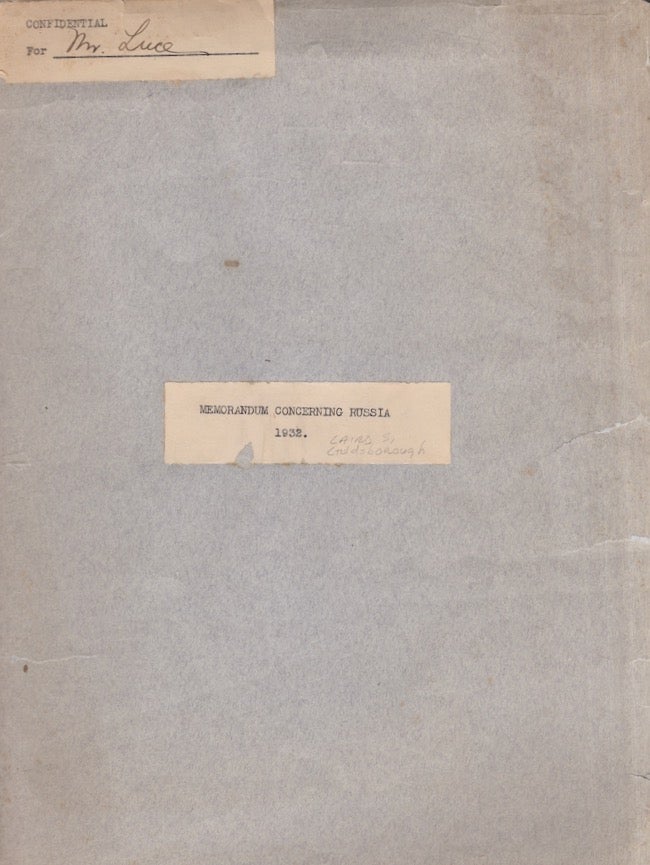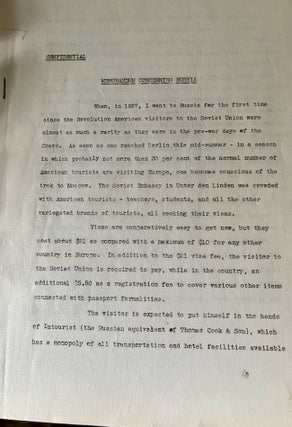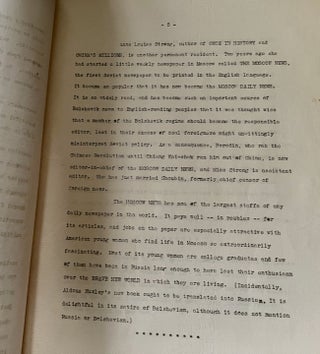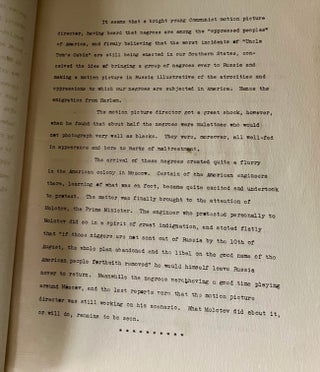Confidential for Mr. Luce: "Memorandum Concerning Russia" 1932
Typescript Report [New York?]: 1932.
Manuscript. Typescript. Approx. 8.5" x 11". 50 typed pages, single spaced, rectos only. Typed report placed inside torn, split/detached and chipped gray paper wraps. Two paper labels on the front wrap folder. The first label, located in the upper left corner, has the typed words "Confidential For" and a solid line with the hand written name Mr. Luce. The second typed label is the title - "Memorandum Concerning Russia 1932." Written in pencil inside the front wrap (possibly in the hand of Henry Luce) "Extremely interesting report done by Laird Goldsborough, one of the very few persons to see Russia at the time keep." Some pencil underlining on pages 48-50. A few spots to the paper. Condition is good. Good. Item #27685
Contents of the report cover Goldsborough's wide range of observations made during his stay. He writes about the Bolsheviks, handling of passports, taking government approved tours, Americans who live and work in Moscow, international visitors, reporting of news, transportation means, prevalence of motor cars, hotels and the hospitality industry, the status of workers, state of currency, 5 year plan on the production of consumer goods, politics, and international affairs. Many references made to Lenin in the report.
Pages 6 and 7 of the report references a group of of African Americans in Moscow. Goldsborough writes: "Speaking of more or less permanent residents of Moscow from the United States reminds one that quite a tempest in a teapot has been stirred up in Moscow this summer by the arrival and installation in one of the largest hotels of about forty Negroes from Harlem district in New York." He adds "It seems that a bright young Communist motion picture director, having heard that Negroes are among the "Oppressed peoples" of America, and firmly believing that the worst incidents of "Uncle Toms Cabin" are still being enacted in our Southern States, conceived the idea of bringing a group of Negroes over to Russia and making a motion picture in Russia illustrative of the atrocities and oppressions to which our Negroes are subjected in America..."
Page 35 concerns the rise of Japan. Goldsborough writes, "The best-posted man on foreign affairs in Russia, outside of the Foreign Minister himself, is probably Karl Radek, Editor of "Izvestin" and personally one of the ablest and most interesting man in the Soviet Union. Radek, Undoubtedly expressing the official mind, said this in relation to Japan: "It seems to me that America does not realize the danger of the Japanese menace. American policy has been completely defeated in the Far East...""
Some pencil underlining on page 48 seems to summarize the balance of restrictions for the citizens with the goal of benefiting them in the future. Goldsborough states, "However disagreeable many of the policies of the present Government may be, the people of the country are convinced that any alternative to the Government would represent something in nature of a return to Czarism. From any such possibility the popular mind of Russia revolts with abhorrence."
Laird Goldsborough was the Foreign News Editor at Time magazine in the 1920's. He is reported to have held strong right wing conservative opinions. The editor that preceded Luce, Britton Hadden, had kept Goldsborough views in check. Hadden was a strong supporter of Democracy and attacked the fascist Mussolini. Goldsborough, however, praised Mussolini. In 1927 Hadden switched positions with Henry Luce. Goldsborough found Luce more sympathetic to his views. (summarized from "Sparticus-Educational). Goldsborough "committed suicide" in 1950 although many believed it was murder.
Henry Luce was the editor of Time and other notable publications. The bulk of his archive is held at the New York Historical Society. This report bears no markings other than the title labels. Provenance unknown. No matches for this memo found in recent internet searches. From the site erenow dot net: "Prior to 1939 Luce’s interest in politics and world affairs had been generally fleeting. He seldom made overt political statements in public, and he was reticent about expressing his own views openly in his magazines. In fact he tolerated, at times almost encouraged, views that he himself did not share. For years he permitted Time’s foreign editor, Laird Goldsborough, to cover the European crises of the 1930s by lionizing Mussolini and shrugging off the threat of Hitler. Goldsborough was a good writer and an efficient editor, and that was enough for Luce"
Price: $950.00






